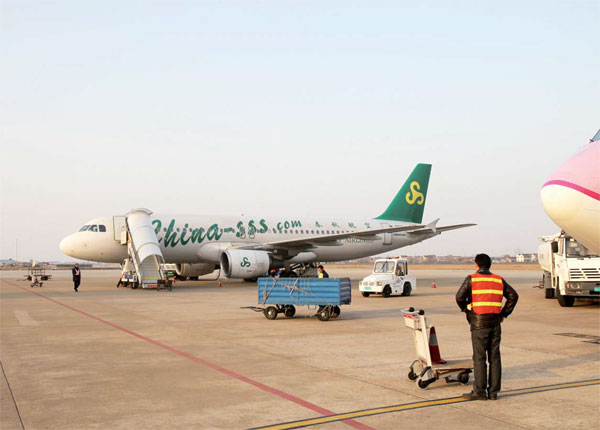Budget airlines to soar as limits lifted
|
A Spring Airlines plane in Nantong, Jiangsu province. Low-cost airlines are set to take off in China. Provided to China Daily |
New civil aviation rules present a golden opportunity for low-cost carriers to expand in China
China is likely to see a boom in budget airlines following a decision by the Civil Aviation Administration to ease regulations.
The administration released a notice to cancel limits on the lowest price, which means airlines can provide more discounts. The largest discount for air tickets had been 45 percent, under the former regulations.
Meanwhile, the administration is encouraging main Chinese carriers and private capital investors to put money into budget airlines.
The civil aviation authority also is working on policies to support the growth of budget airlines, including airplane purchases and route allocations, Xia Xinghua, deputy director of the administration, said at a seminar on budget aviation.
Airplane purchases, route applications and jet fuel prices are the main obstacles facing Chinese low-cost airlines.
The authority is also considering developing standards for budget airlines because there is no official definition for them in China.
Features of budget airlines globally include cheaper tickets, higher income from non-flight business and lower operational costs.
Only two Chinese airlines are low-cost carriers at the moment: Shanghai-based Spring Airlines Co Ltd and Chongqing-based West Air Co Ltd.
"Changing the lowest price is definitely good news for privately owned airlines," says Wang Zhenghua, chairman of Spring Airlines, the largest budget carrier in China.
Spring Airlines was fined by the local pricing bureau in Jinan, Shandong province, in 2006 because it provided some tickets at 1 yuan on its Shanghai-Jinan route. The price violated the Civil Aviation Administration of China's former regulations. The carrier withdrew from the route.
"According to the new rules, tickets costing only 1 yuan will not be forbidden anymore," Wang says.
The budget airline also noticed it is now much easier to purchase new aircraft.
Wang says it used to take four to five months for Spring Airlines to apply to buy a new aircraft but the period has been shortened dramatically.
Spring Airlines plans to enlarge its fleet by 40 aircraft by 2015. It already has 39 airplanes, and its fleet will total 46 aircraft by the end of this year.
"We still plan to purchase eight to 10 aircraft every year," Wang says.
West Air, a subsidiary of HNA Group, which completed its transformation to a budget airline at the end of 2012, also plans to increase its fleet. It will add four aircraft in 2014.
Some other airlines are also trying to turn into budget airlines because of the business opportunities they present.
China United Airlines Co Ltd, a Beijing-based subsidiary of China Eastern Airlines Co, is working on a plan to turn into a low-cost carrier.
Juneyao Airlines Co Ltd, a privately owned carrier, also applied to launch a low-cost carrier called Jiuyuan Airlines. It means the airline will provide special tickets priced between 9 to 49 yuan at certain times.
"We can expect more budget airlines in China because the authority's support may make it easier to enter the business," says Li Xiaojin, a professor at China Aviation University in Tianjin.
The Chinese are getting used to traveling by air, with air traffic growing fast and providing more customers to budget airlines, he adds.
Chinese airlines reported 319.36 million person-trips in 2012. The number reached 326.1 million in the first 11 months of 2013, according to the CAA.
But it is still difficult to operate budget airlines, which need to lower their costs and improve load factors at the same time, Li says.
"Low-cost airlines need enough passenger flow to make a profit because their ticket price is low."
Improving efficiency is the main strategy for budget airlines to lower operational costs.
West Air's overall costs in 2013 were reduced 15 percent over 2012 through improving plane-use rates and upgrading operational systems.
The daily use rate of an airplane by West Air is about 12 to 13 hours, while the average number in the industry is about 9.8 hours a day, says Liu Feihu, control manager of the carrier's operations center.
"Reducing the ground handling time is an important way to improve the use-rate," he adds.
The carrier, which uses the 13 Airbus 320 family aircraft, runs more than 70 domestic flights daily.
Accordingly, the airline's ticket price is about 15 percent lower than the market average.
The carrier provided more than 10,000 tickets with 70 to 90 percent discounts. Some tickets were only priced at 8 yuan in November 2013.
After the transformation from being a traditional airline into a low-cost airline, West Air's flights load factor also increased by 5 percent, reaching 90 percent.
However, low-cost carriers still have to cultivate the market before they can gain more market share.
"People's acceptance of budget airlines is still a challenge for us," says Cen Jianjun, vice-president of West Air.
As a low-cost airline, West Air still provides in-flight food and a free luggage check-in service, which incur fees at other budget airlines, Cen says.
Chinese budget airlines also need to increase income from non-flight business, which is a common strategy among low-cost airlines.
Income from non-flight business accounted for only 3 percent of West Air's total income in 2013, while the percentage for Air Asia was about 20 percent.
Currently, West Air's non-flight business includes insurance, hotel booking, tourism and vehicle rental.
The carrier plans to increase income from non-flight business to 5 percent in 2014 by offering extra services.
"We will provide full travel services in the future," says Xiao Lin, general manager of the carrier's marketing and sales department.
It is an advantage for the carrier that its parent group has other tourism subsidiaries covering hotels, travel agencies and tourism destinations.
"It is easier for us to cooperate," Xiao adds.
Contact the writer at wangwen@chinadaily.com.cn
wangwen@chinadaily.com.cn

























